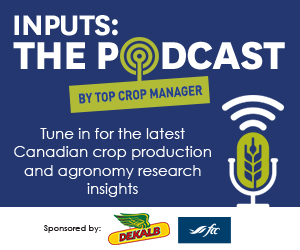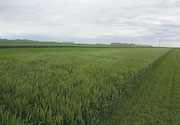| |
| |
 |
 |
| |
 |
|
@{mv_date_MMM d, yyyy}@ |
|
| |
 Corn ear moulds occur every year in Ontario. These mycotoxins, particularly DON, are produced primarily by Gibberella/Fusarium ear moulds and can be disruptive when fed to livestock, especially hogs.
» Read more...
Corn ear moulds occur every year in Ontario. These mycotoxins, particularly DON, are produced primarily by Gibberella/Fusarium ear moulds and can be disruptive when fed to livestock, especially hogs.
» Read more...
The label now includes control of wild oat and volunteer canola, and upgrades efficacy against lamb’s quarters, wild buckwheat and redroot pigweed from suppression to control.
» Read more...
The Top Crop Summit is returning to TCU Place in Saskatoon on Feb. 22 and 23, 2023, with the latest agronomic info and research updates. Register before Dec. 15 for a chance to win your pass for free!
» Register now...
|
| |
 |
 |
| |
|
| |

Palmer amaranth is a term that makes farmers and agronomists shudder a little each time it’s mentioned. Native to the United States, it’s an invasive weed that has been on the radar in Canada for several years due to its ability to develop herbicide resistance so quickly. As Kim Brown-Livingston states, it grows quickly and causes incredible economic damage, making it a super (concerning) weed.
In this episode, Brown-Livingston, provincial weed specialist with Manitoba Agriculture and Rural Development, chats with co-host Dylan Sjolie about Palmer amaranth. With recent findings of the weed in Manitoba, Brown-Livingston shares details about Palmer amaranth, and what to do if it shows up in your field.
» Listen now... |
| |
|
| |
 Farm-saved seed is a common practice for wheat growers on the Prairies to cut costs, but there’s not much independent research on how it performs compared to Certified seed. Historically, most western Canadian wheat acres are seeded with farm-saved seed. Producers will introduce better genetics with Certified seed, and then using farm-saved seed for a couple years afterwards.
» Learn more...
Farm-saved seed is a common practice for wheat growers on the Prairies to cut costs, but there’s not much independent research on how it performs compared to Certified seed. Historically, most western Canadian wheat acres are seeded with farm-saved seed. Producers will introduce better genetics with Certified seed, and then using farm-saved seed for a couple years afterwards.
» Learn more... |
| |
 Clubroot-resistant cultivars are key to managing this disease, but the pathogen excels at evolving new races, or pathotypes, that can overcome a cultivar’s resistance. The University of Saskatchewan’s Wei Xiao is leading research on a new, more durable type of clubroot resistance. He’s also looking to optimize CRISPR for efficient canola breeding and to edit canola for clubroot resistance.
» Learn more...
Clubroot-resistant cultivars are key to managing this disease, but the pathogen excels at evolving new races, or pathotypes, that can overcome a cultivar’s resistance. The University of Saskatchewan’s Wei Xiao is leading research on a new, more durable type of clubroot resistance. He’s also looking to optimize CRISPR for efficient canola breeding and to edit canola for clubroot resistance.
» Learn more... |
| |
 |
 |
| |
|
| |
|
|
| |
| |










